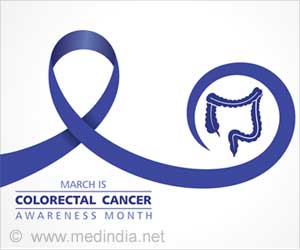, or rectal bleeding.
However, with ample screening methods available, the disease equally remains preventable and treatable.
Burden of Colorectal Cancer
Asia is considered to have the highest burden of colorectal cancer, with more than half of all cases and deaths being recorded.
Over half a million new cases of colorectal cancer with more than 280,000 deaths per year are recorded by China alone. Japan accounts for the second highest number of mortality (60,000 deaths per year).
Nearly 2 million cases of colorectal cancer were diagnosed globally in 2020, making it the third most common cancer type and second commonest cause of cancer deaths (1 million deaths per year).
The global burden of colorectal cancer is estimated to increase by 56% between 2020 and 2040 as per the International Agency for Research on Cancer (IARC).
History of Colorectal Cancer Awareness Month
The Prevent Cancer Foundation first designated March as National Colorectal Cancer Awareness Month in 1999.
The designation finally received its official remark on November 19, 1999, with combined work of Prevent Cancer Foundation, American Digestive Health Foundation, and the National Colorectal Cancer Roundtable.
The U.S. Senate further declared the designation after a resolution of the House of Representatives and an official proclamation by the White House. The National Colorectal Cancer Awareness Month was declared as a march in the United States of America (USA) by President Bill Clinton in February 2000.
CRC Awareness Month
Protecting the health of all those affected with CRC by increasing access to life-saving resources for further prevention, detection, and treatment of colorectal cancer remains the main stay of this National Colorectal Cancer Awareness Month.
You may raise public awareness by initiating the blue light up of a landmark, dressing up in blue themes, distributing blue cupcakes at your place, promoting live events, or sharing your initiatives through social media.
Everyone is invited to join the whole-month drive by encouraging the early screening methods, increasing high-quality care, expanding the CRC research fundings for further clinical trials and precision medicine, and forming multiple supportive communities through fun-filled activities.
“I encourage all citizens, government agencies, private businesses, non-profit organizations, and other groups to join in activities that will increase awareness and prevention of colorectal cancer” JOSEPH R. BIDEN JR., president of the United States of America.
Risk Factors for Colorectal Cancer
Some of the factors that may affect the risk of developing CRC are:
-
Alcohol consumption has accounted for over 160,000 new colorectal cancer in 2020 (8% of all the disease cases). -
Tobacco smoking is also found to contribute to the burden of colorectal cancer. -
Obesity was liable for over 85,000 colon cancer cases with 25,000 cases of rectal cancer in 2012 (23% of all colorectal cancer in 2012).
Hence, IARC research projects focus on reducing the risk factors of CRC by lifestyle modifications (physical activity, increased intake of fruits, vegetables, fish, and weight loss strategies) and early screening methods.
This National Colorectal Cancer Awareness Month, Ensure a “Healthy Life” For All.
References:
- Colorectal Cancer Awareness Month 2022
– (https://www.iarc.who.int/featured-news/colorectal-cancer-awareness-month-2022/) - National Colorectal Cancer Awareness Month
– (https://www.preventcancer.org/event/national-colorectal-cancer-awareness-month-2022/) - Everyone Deserves a Healthy Life
– (https://www.ccalliance.org/about/awareness-month) - 2022 COLORECTAL CANCER
AWARENESS MONTH ACTIVITIES – (https://coloncancercoalition.org/wp-content/uploads/2021/12/BlueForCRC_2022_Packet_Healthcare.pdf) - A Proclamation on National Colorectal Cancer Awareness Month, 2022
– (https://www.whitehouse.gov/briefing-room/presidential-actions/2022/02/28/a-proclamation-on-national-colorectal-cancer-awareness-month-2022/)
Source: Medindia



